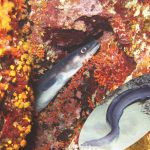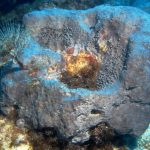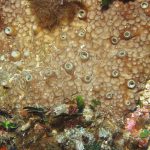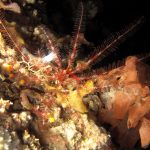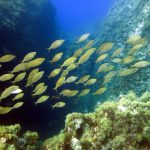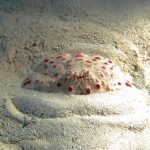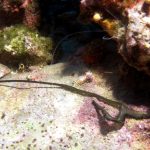Pinna nobilis, the Fan Mussel (a.k.a. Noble Pen Shell or Nakkra in Maltese), is a large species of Mediterranean clam, a marine bivalve mollusc in the family Pinnidae, the pen shells.
The Noble Pen Shell is an emblematic endemic species to the Mediterranean Sea, where it lives offshore at depths ranging between 0.5 and 60 metres. It could be found buried beneath soft-sediment areas (fine sand, mud, often anoxic).
The genus Pinna belongs to the family Pinnidae, order Pteriida, class Bivalvia, phylum Mollusca and kingdom Animalia.
The bivalve shell is usually 30 to 50 cm long, but can reach a height of 120 cm. Its shape differs depending on the region it inhabits. Like all pen shells, it is relatively fragile to pollution and shell damage. It attaches itself to rocks using a strong byssus composed of many silk-like threads which used to be made into cloth. The animal secretes these fibres from its byssus gland; they consist of keratin and other proteins and may be as long as 6 cm. The inside of the shell is lined with brilliant mother-of-pearl.
In fact, the Fan Mussel is the origin of sea silk, which was made from the byssus of the animal. Thus its other Maltese common name Nakkra tal-Harir, literally meaning Silk Fan Mussel.
As with other members of its genus, Pinna nobilis hosts symbiotic shrimp which live inside its shell. It is believed that when it sees a threat, the shrimp warns the host, perhaps by retracting its claws or even by pinching. The clam then closes shut. It has been demonstrated that the shrimp has a similar filter-feeding diet to its host and the relationship is likely mutualistic.
In recent years, Pinna nobilis has become threatened with extinction, due in part to fishing, incidental killing by trawling and anchoring, and the decline in seagrass fields; pollution kills eggs, larvae, and adult mussels. The Noble Pen Shell has been listed as an endangered species in the Mediterranean Sea. The European Council Habitats Directive 92/43/EEC, on conservation of natural habitats and the wild fauna and flora, proclaims that Pinna nobilis is strictly protected (by the Annex IV of EEC, 1992) – all forms of deliberate capture or killing of fan mussel specimens are prohibited by law.
Unfortunately, in the past two years a mass mortality event of the noble pen shell was detected in the western Mediterranean Sea. The cause is very likely to be a recently identified parasite.
Dead molluscs are recognised as they are found on the bottom, open and empty, though in some cases they can still be anchored to the bottom. Unhealthy individuals affected by the parasite, but still living, close their valve very slowly and show a lack of response to stimuli.
Thus, the Physical Oceanography Research Group – University of Malta have launched a very important survey on Pinna nobilis. To better understand the mass mortality event and devise an action plan, YOUR HELP IS NEEDED. So please fill the quick online questionnaire: www.tinyurl.com/AMArePinnaNobilis.
The photo of this Fan Mussel was taken at a depth of 32 metres at Ras il-Ħobż on Gozo’s south coast.
Photo taken by Brian Azzopardi


